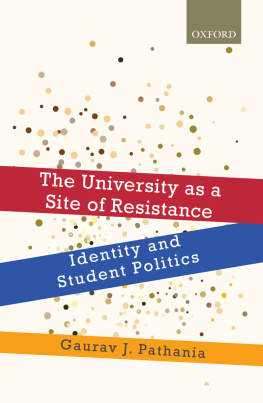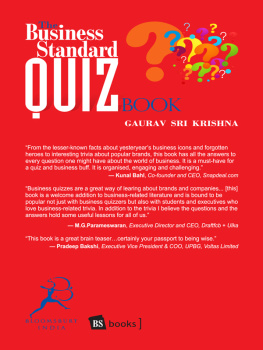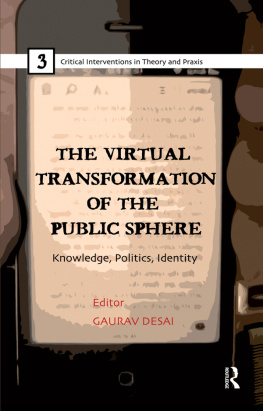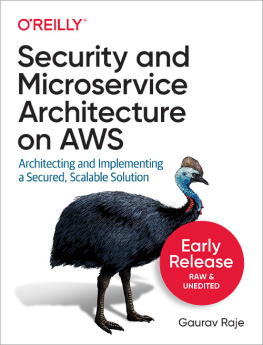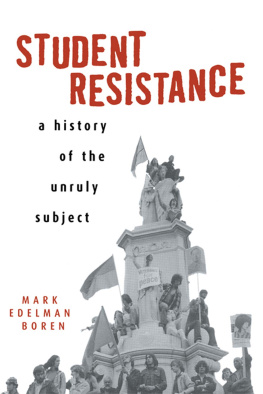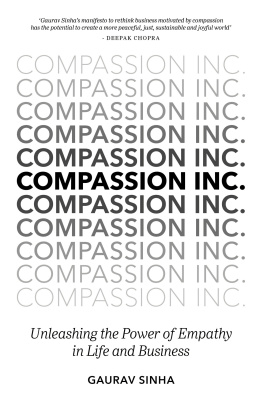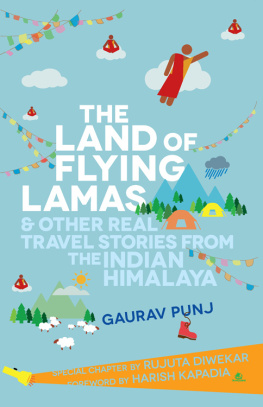Gaurav J. Pathania - The University as a Site of Resistance: Identity and Student Politics
Here you can read online Gaurav J. Pathania - The University as a Site of Resistance: Identity and Student Politics full text of the book (entire story) in english for free. Download pdf and epub, get meaning, cover and reviews about this ebook. year: 2018, publisher: OUP India, genre: Politics. Description of the work, (preface) as well as reviews are available. Best literature library LitArk.com created for fans of good reading and offers a wide selection of genres:
Romance novel
Science fiction
Adventure
Detective
Science
History
Home and family
Prose
Art
Politics
Computer
Non-fiction
Religion
Business
Children
Humor
Choose a favorite category and find really read worthwhile books. Enjoy immersion in the world of imagination, feel the emotions of the characters or learn something new for yourself, make an fascinating discovery.
- Book:The University as a Site of Resistance: Identity and Student Politics
- Author:
- Publisher:OUP India
- Genre:
- Year:2018
- Rating:3 / 5
- Favourites:Add to favourites
- Your mark:
- 60
- 1
- 2
- 3
- 4
- 5
The University as a Site of Resistance: Identity and Student Politics: summary, description and annotation
We offer to read an annotation, description, summary or preface (depends on what the author of the book "The University as a Site of Resistance: Identity and Student Politics" wrote himself). If you haven't found the necessary information about the book — write in the comments, we will try to find it.
The University as a Site of Resistance: Identity and Student Politics — read online for free the complete book (whole text) full work
Below is the text of the book, divided by pages. System saving the place of the last page read, allows you to conveniently read the book "The University as a Site of Resistance: Identity and Student Politics" online for free, without having to search again every time where you left off. Put a bookmark, and you can go to the page where you finished reading at any time.
Font size:
Interval:
Bookmark:
The University as a Site of Resistance
The University as a Site of Resistance
Identity and Student Politics
Gaurav J. Pathania


Oxford University Press is a department of the University of Oxford.
It furthers the Universitys objective of excellence in research, scholarship,
and education by publishing worldwide. Oxford is a registered trademark of
Oxford University Press in the UK and in certain other countries.
Published in India by
Oxford University Press
2/11 Ground Floor, Ansari Road, Daryaganj, New Delhi 110 002, India
Oxford University Press 2018
The moral rights of the author has been asserted.
First Edition published in 2018
All rights reserved. No part of this publication may be reproduced, stored in
a retrieval system, or transmitted, in any form or by any means, without the
prior permission in writing of Oxford University Press, or as expressly permitted
by law, by licence, or under terms agreed with the appropriate reprographics
rights organization. Enquiries concerning reproduction outside the scope of the
above should be sent to the Rights Department, Oxford University Press, at the
address above.
You must not circulate this work in any other form
and you must impose this same condition on any acquirer.
ISBN-13 (print edition): 978-0-19-948841-4
ISBN-10 (print edition): 0-19-948841-X
ISBN-13 (eBook): 978-0-19-909369-4
ISBN-10 (eBook): 0-19-909369-5
Typeset in Bembo Std 10.5/13
by Tranistics Data Technologies, Kolkata 700 091
Printed in India by Rakmo Press, New Delhi 110 020
To Michelle
Contents
TABLES
MAPS
While I was on my morning walk, a small crowd gathered around a tree near the library caught my attention. It was the fifth day of my pilot field study at Osmania University in Hyderabad in December 2012 and I enjoyed walking around campus, observing student life. Inquisitively, I approached the crowd. I thought that some students may be protesting or preparing for an agitation that day, which is routine at Osmanias College of Arts and Social Sciences (known as Arts College). Making my way through the crowd, I found that they had taken down the body of a young student who had hanged himself. One student had tears in his eyes as he read the suicide note found on the body. The letter stated the financial crisis his family faced and how his education did not lead to a job. The letter concluded with an appeal to the government to grant separate statehood to the Telangana region in the state of Andhra Pradesh.
Two students made calls to the family of the deceased young man. I heard spectators commenting that this area had become a suicide point. Listening to the discussion, I discovered that the victim was not a student of Arts College but of another college of Osmania, and that this was part of a growing trend, whereby outsiders committed suicide at this suicide point. Later, I returned to Narmada Research Scholars (NRS) hostel where I was staying.
After about an hour, I noticed a larger crowd of students carrying the corpse, holding banners and shouting the slogan Jai Telangana, Jai Jai Telangana. I stopped at the nearby tea stall to see if I could understand what the commotion was about. Media and police personnel were sipping tea and discussing the incident as if it was routine for them. As I approached Arts College where students were protesting, I saw that they had blocked the main road and burned an effigy of the chief minister. Approximately 25 student leaders took turns addressing the gathering and each renewed their demand for a separate Telangana state, chanting, abhi nahi to kabhi nahi! [(Telangana,) now or never!].
After a few hours of protest, police warned the crowd to disperse but the students were determined to stay. In the meantime, a government minister arrived and met student leaders. I noticed that from all the student leaders speaking to the crowd, only one of them could speak fluent English. As a result, he had been nominated to serve as the national spokesperson of Osmania University-Student Joint Action Committee (OU-JAC). He told the media that it was an unfortunate fact that thousands of students had lost their lives in the 50-year long struggle for separate statehood, while the government continues to play its dirty politics. Amidst this rally, I was curious to understand how an outsider could leave his college to commit suicide near the Arts College building. This is a sacred place for Telangana activists, one leader told me. While chatting with him, I came to know that he faced more than 100 criminal charges since he led the biggest student agitation in 2009 for the same cause. It shocked me even more when he told me, There are 50 other student activists who are facing a similar number of charges and need to appear in court almost every week. He expressed himself in broken English with the help of his friend. Once he left, I enquired about his age and was told that he was the senior most student leader of Arts College, more than 40 years old, and had gained tremendous respect among students since he took an oath to remain unmarried to serve the people of Telangana. There were other activists who had made the same promise. During the protest rally, I met a much older man, an alumnus of the campus who had written 80 novels and stories, and had publicly vowed to produce a book on Telangana every month until it became a state. Such was their passion that some students even used Telangana as their surname. This piqued my interest in such an intense movement for statehood that I felt the need to explore this university as a site of resistance.
This book is the outcome of nearly a year of fieldwork in Hyderabad and presents an ethnography of activists everyday life on campus. How did their activism deal with the issues and problems of the Telangana region? How did their demand for Telangana statehood succeed? The volume also provides a theoretical debate on old and new social movements and argues that the Telangana movement should be viewed as new social movement. This book attempts to establish the Telangana movement as a cultural movement, rather than merely a political one, as many scholars argue.
Social movement is a process of consciousness and representation that requires material and cultural resources for its existence. But consciousness of cultural resources has largely been given an industrial answer. Culture cannot be reduced to mere economic or political factors, it cannot be understood, either, without understanding the economic context that surrounds and shapes it. What Telangana student activists gained after joining an institution of higher education is access to cultural capital and consciousness of cultural resources unique to their identity. That is why cultural identities, whether custom or costume, food or festivals, language or life-world, caste or region, are instrumental to the functioning of Indian politics.
Without the help of my activist-friends from Arts College, Osmania University, Hyderabad, and the English Foreign Language University, this research would not possible. I would like to thank Dr Kolluri Chiranjeevi, Dr Sujatha Surepally, Kota Rajesh, Mohan Dharawath, Mothe Sammiaha, P. Mukhesh, Panthukala Srinivas, Shankar Sampangi, Stalin, Sunil Shetty, and Srinivas Gellu for their unwavering support. Similarly, several discussions with the late Professor G. Krishna Reddy of Arts College compelled me to reflect on the importance of the concept of Joint Action Committee (JACs) in the Telangana movement. His sudden demise in 2016 was a huge loss for scholars working on Telangana issues. Several interactions with Professor Keshav Rao Jadhav, one of the key figures of Telangana movement, shaped my understanding of a mass movement.
Next pageFont size:
Interval:
Bookmark:
Similar books «The University as a Site of Resistance: Identity and Student Politics»
Look at similar books to The University as a Site of Resistance: Identity and Student Politics. We have selected literature similar in name and meaning in the hope of providing readers with more options to find new, interesting, not yet read works.
Discussion, reviews of the book The University as a Site of Resistance: Identity and Student Politics and just readers' own opinions. Leave your comments, write what you think about the work, its meaning or the main characters. Specify what exactly you liked and what you didn't like, and why you think so.

